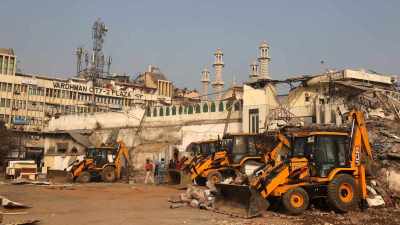Stay updated with the latest - Click here to follow us on Instagram
Future Perfect
What will our cities look like by the year 2050? Will they be smog-filled carcasses of once-thriving urban centres.
Ecopolis
Discovery Channel
Monday,9 pm
**
Whats it about?What will our cities look like by the year 2050? Will they be smog-filled carcasses of once-thriving urban centres? Will garbage be flowing out of heaps on the outskirts and filling up our streets and parks? How much longer can cities suck the countryside dry of resources? These are the questions that Ecopolis,Discovery Channels new series,will explore over the course of six episodes. The show will project an Ecopolis a city of the future which has ecologically,and economically,sustainable growth,with public transport being run on garbage fuel and rooftop gardens growing the citys supply of vegetables and maybe even livestock.
This is not a show that tells us explicitly how to live our lives in order to reduce our carbon footprint. But the advice is implicit in every new idea discussed. When Ecopolis raises the question of whether our cities overflowing mounds of garbage can be used to provide a clean fuel for our public transport,were forced to think about how much trash we actually create. The visuals of Manilas reeking landfills is a shocking sight,even to those of us whove grown up seeing trash carelessly strewn about in public.
Whos in it?The series is anchored by Dr Daniel Kammen,a co-ordinating lead author of the Intergovernmental Panel on Climate Change,which won the Nobel Peace Prize in 2007. So its appropriate for him to be a focal point of a show which discusses 20 game-changing ideas from sound-powered refrigerators to nano-solar cells used to generate electricity for an entire building.
Whats hot?The good thing about this show is that its not preachy. It acknowledges that weve made a mess of our planet,but it doesnt dwell on it. Urbanisation is not demonised and is accepted as an inevitable stage in the evolution of society. In fact,solutions are offered to nullify the negative impact that the rapid growth of cities has had on the environment.
Another great thing is the fast pace. The 20 different innovations for a better city are explored in just the right amount of detail without dwelling on jargon,which may prove too much for viewers whore not well-versed with science. Everything is explained in basic terms,using a great deal of 3-D modelling and projections.
Whats not?We wish the host had been a little more charismatic and commanded attention a bit more. Of course,this is not An Inconvenient Truth and getting Al Gore is not the easiest task in the world. But even someone from the entertainment industry,who is known to seriously engage with environmental issues wouldve made a good option. A scientist to host a science show may be smart,but it can also be boring.
Should you be watching it?It would be great if people could take the time out to watch a show such as this which is trying to make a serious point.






